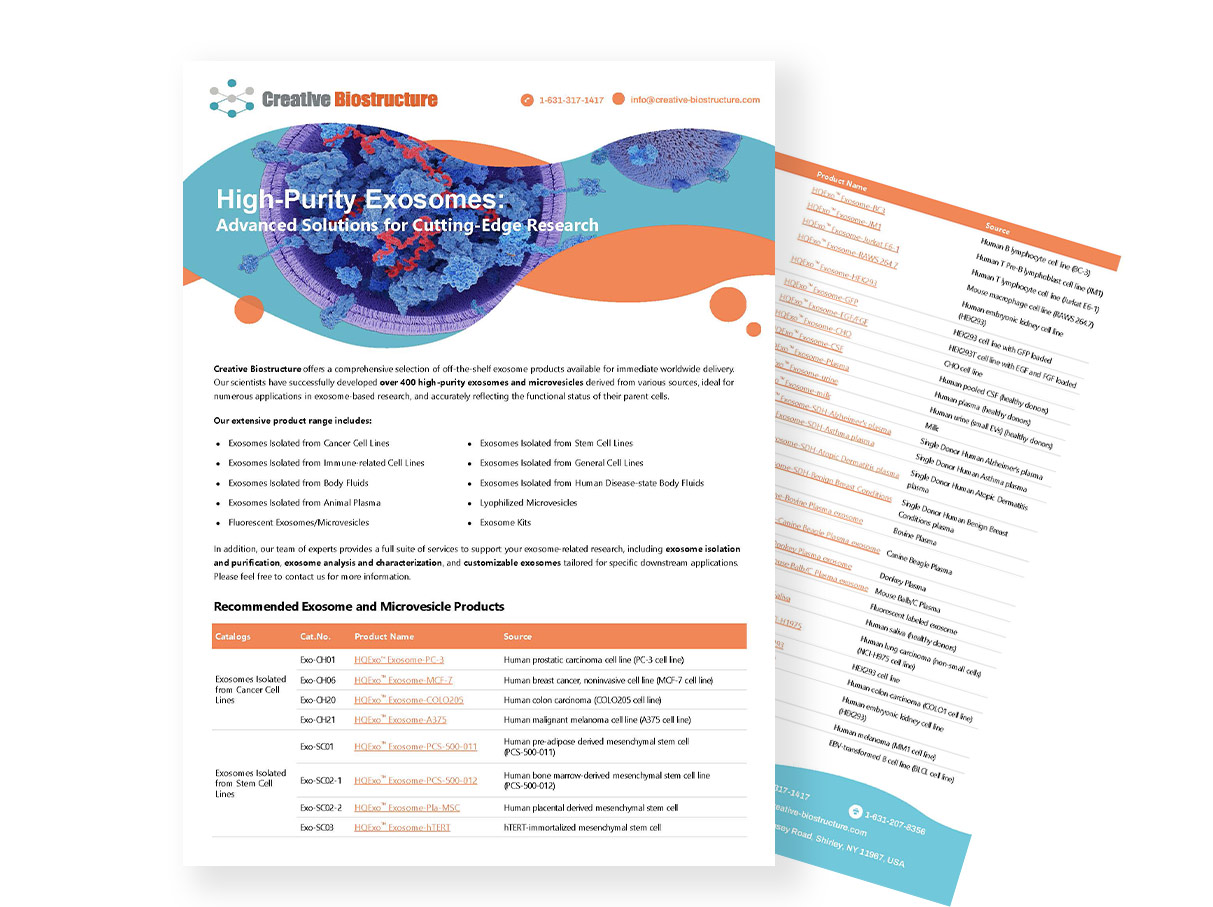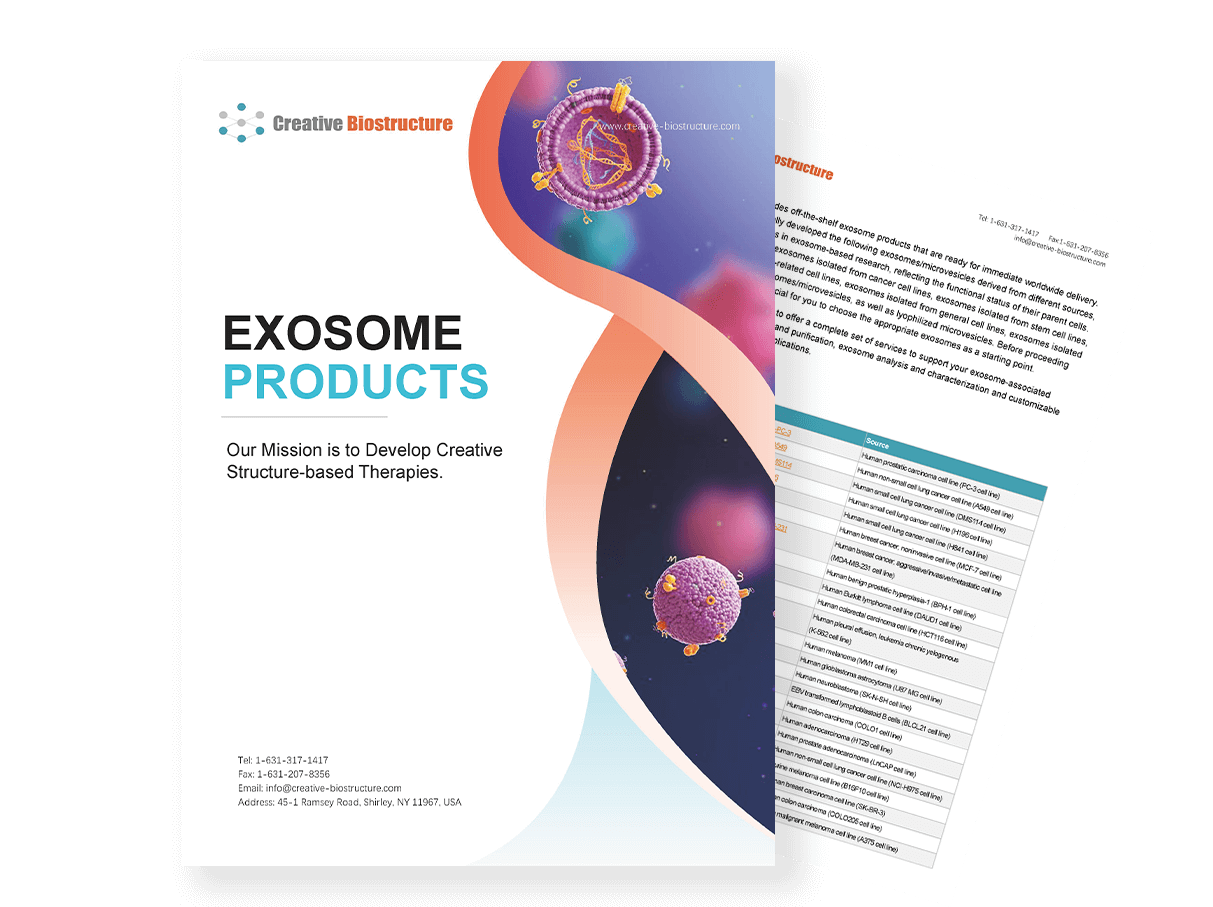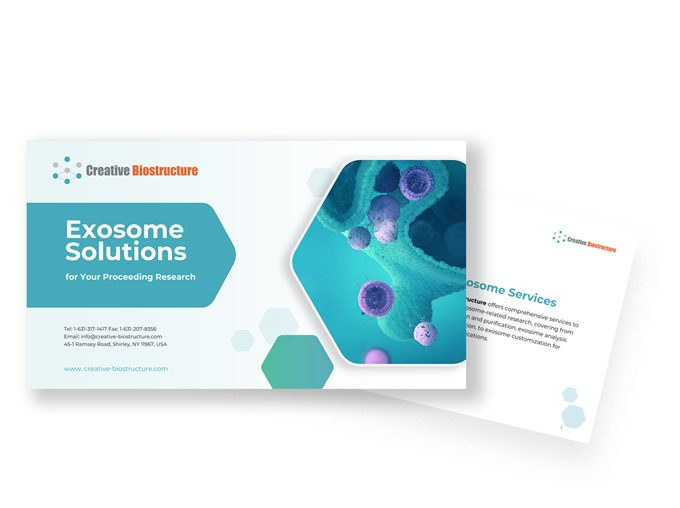Exosomes Isolated from Stem Cell Lines
Creative Biostructure offers stem cell-derived exosomes that not only retain the essential characteristics of their parental cells but are also readily available in standardized and customizable formats. These exosomes can be used as controls for research applications, such as flow cytometry (FACS), Western blotting (WB), and enzyme-linked immunosorbent assay (ELISA), making them indispensable tools for researchers.
Product List
Background
Exosomes are tiny vesicles, ranging from 30 to 150 nm, that originate from the endosomal compartment of cells and are secreted into the extracellular space. Their lipid bilayer membranes contain proteins, lipids, RNA, and DNA, reflecting the content of their cell of origin. They function as biological couriers, transferring molecules between cells and thereby influencing a range of physiological and pathological processes, including immune responses, tumor progression, and tissue regeneration.
Advantages of Stem Cell-Derived Exosomes
Stem cells, particularly embryonic stem cells (ESCs), induced pluripotent stem cells (iPSCs), and mesenchymal stem cells (MSCs), are known for their regenerative and therapeutic potential due to their ability to differentiate into multiple cell types.
Stem cell-derived exosomes offer a unique therapeutic advantage by inheriting the regenerative, anti-inflammatory, and immunomodulatory properties of their parental stem cells. Unlike whole stem cells, exosomes are non-immunogenic, pose no risk of infusion toxicity, and are free from tumorigenic potential and ethical concerns. These nanoscale vesicles efficiently transfer the pluripotent or multipotent capabilities of their origin cells, such as embryonic and adult stem cells, through molecular cargo. This makes them ideal for a wide range of therapeutic applications without the complications associated with stem cell transplantation, such as immune rejection or the risk of abnormal tissue growth.
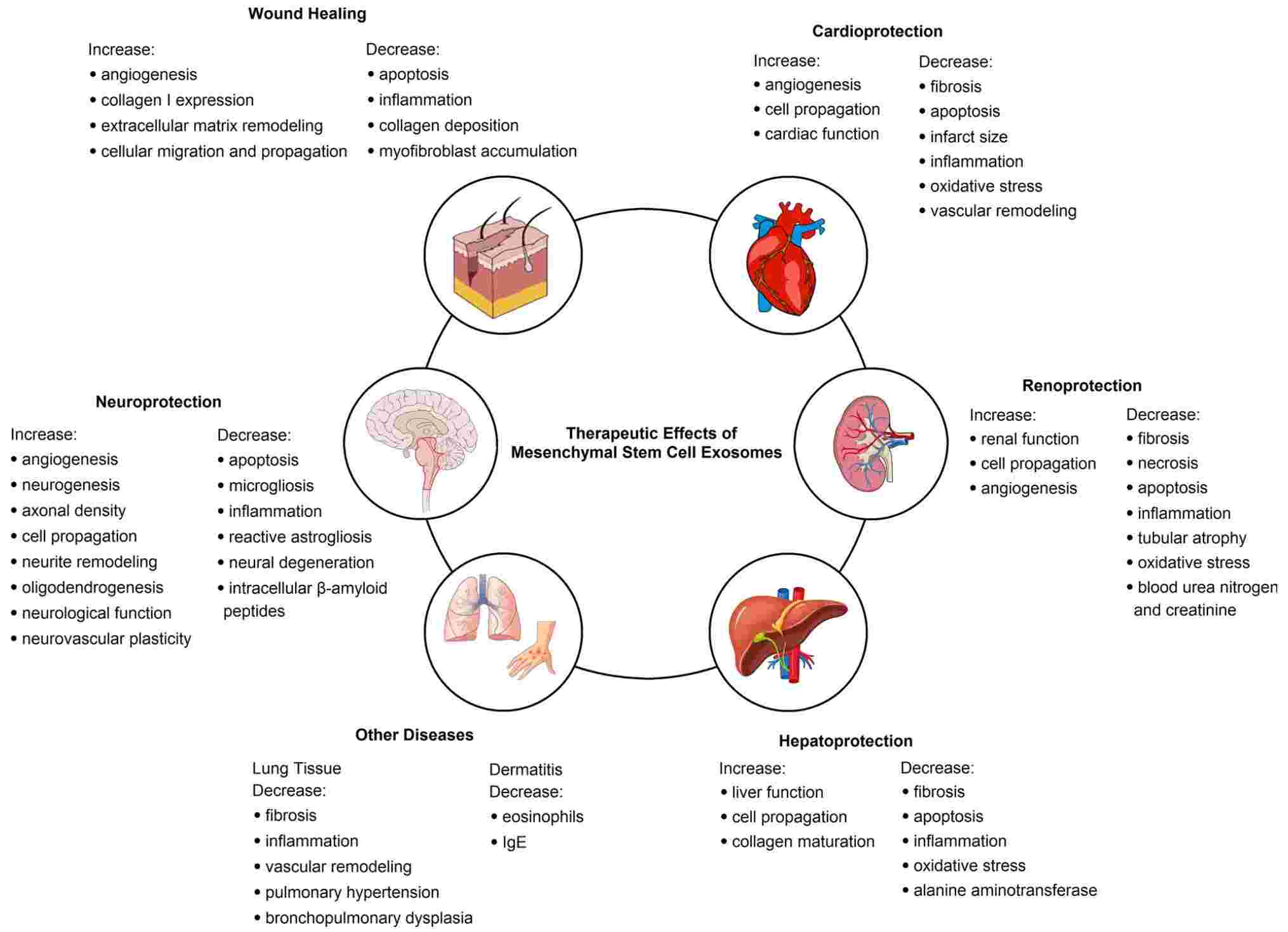 Figure 1. Regenerative impact of mesenchymal stem cell-derived exosomes in various diseases. (Soni V, et al., 2016)
Figure 1. Regenerative impact of mesenchymal stem cell-derived exosomes in various diseases. (Soni V, et al., 2016)
Applications of Stem Cell-Derived Exosomes
Regenerative Medicine
Stem cell-derived exosomes are highly effective in promoting tissue regeneration and repair. By delivering essential bioactive molecules like proteins, lipids, and microRNAs, they activate key cellular repair processes. This makes them invaluable in treating injuries to tissues such as bone, cartilage, and cardiac muscle. These exosomes have demonstrated their ability to stimulate angiogenesis (the formation of new blood vessels), reduce inflammation, and accelerate wound healing. Their therapeutic potential is being explored in conditions like heart disease, neurodegenerative disorders, and traumatic brain injuries, where they enhance tissue recovery by targeting damaged areas and modulating the immune response.
Drug Delivery
Due to their biocompatibility, stability, and ability to traverse biological barriers, stem cell-derived exosomes serve as efficient drug delivery systems. They can be engineered to carry therapeutic cargo, such as small interfering RNA (siRNA), chemotherapeutic agents, or proteins, to target cells, thereby enhancing the efficacy and specificity of treatments. Their small size allows them to avoid the body's immune detection, reducing the risk of adverse reactions. Exosomes derived from MSCs are particularly promising in drug delivery systems due to their inherent regenerative properties and ability to target damaged tissues with precision.
Medical Research
Exosomes from various stem cell lines, including embryonic, induced pluripotent, mesenchymal, neural, and endothelial stem cells, are transforming the landscape of medical research. Their capacity to transport molecular signals and stimulate tissue-specific responses makes them versatile therapeutic agents across numerous fields of medicine.
They are currently being explored in treating diseases across a wide range of medical disciplines, including orthopedic surgery, neurosurgery, plastic surgery, cardiothoracic surgery, urology, and ophthalmology. For instance, stem cell-derived exosomes have shown potential in accelerating bone and cartilage healing in orthopedic surgery, promoting neural regeneration in neurosurgery, and enhancing wound healing in plastic surgery.
Case Studies
Case Study 1: MSC-Exosome Mediated Regulation in Urological Cancer
This research delves into the effects of exosomes derived from mesenchymal stem cells (MSC-exosomes) on various urological cancer cell lines. It uncovers that these exosomes can modulate gene expression patterns linked to crucial cancer processes such as epithelial-mesenchymal transition (EMT), angiogenesis, and apoptosis. The study reveals a pronounced therapeutic effect of MSC-exosomes, particularly in bladder cancer cells, where they enhance apoptosis and curb cell growth. The results propose MSC-exosomes as a potential novel therapeutic agent for the treatment of urological cancers, highlighting their ability to repress tumor progression by influencing cellular pathways.
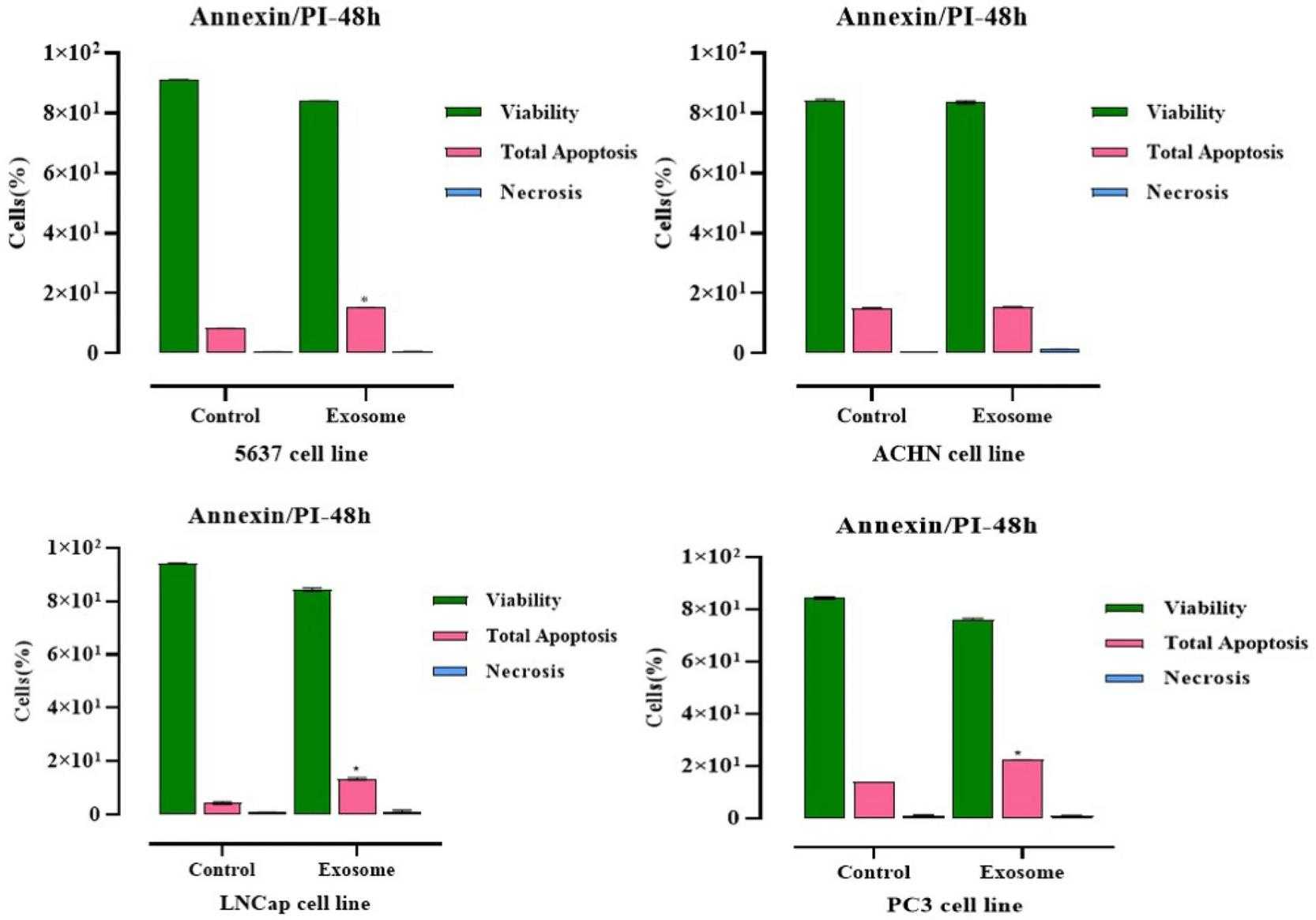 Figure 2. Exosome-induced apoptosis in urological cancer cell lines. Flow cytometry analysis depicting the apoptotic effects of mesenchymal stem cell-derived exosomes on various urological cancer cells. (Rezaeian A R, et al., 2022)
Figure 2. Exosome-induced apoptosis in urological cancer cell lines. Flow cytometry analysis depicting the apoptotic effects of mesenchymal stem cell-derived exosomes on various urological cancer cells. (Rezaeian A R, et al., 2022)
Case Study 2: Characterization of Exosomal miRNAs in Human Neural Stem Cells
This study explored the miRNA content within exosomes derived from human neural stem cells (hNSCs), which are known for their role in cell-to-cell communication. Utilizing next-generation sequencing, the researchers identified a diverse array of miRNAs, many of which were specifically enriched in exosomes, suggesting a selective sorting mechanism for their extracellular release. A particular focus was placed on the miRNA subtype hsa-miR-1246, which was found to be highly shuttled within exosomes. Through real-time PCR, the researchers quantified the stoichiometry of hsa-miR-1246 per exosome, providing insight into the potential therapeutic delivery capacity of these exosomal miRNAs. Additionally, an in vitro system was employed to validate the functional transfer of this miRNA, demonstrating its ability to modulate gene expression.
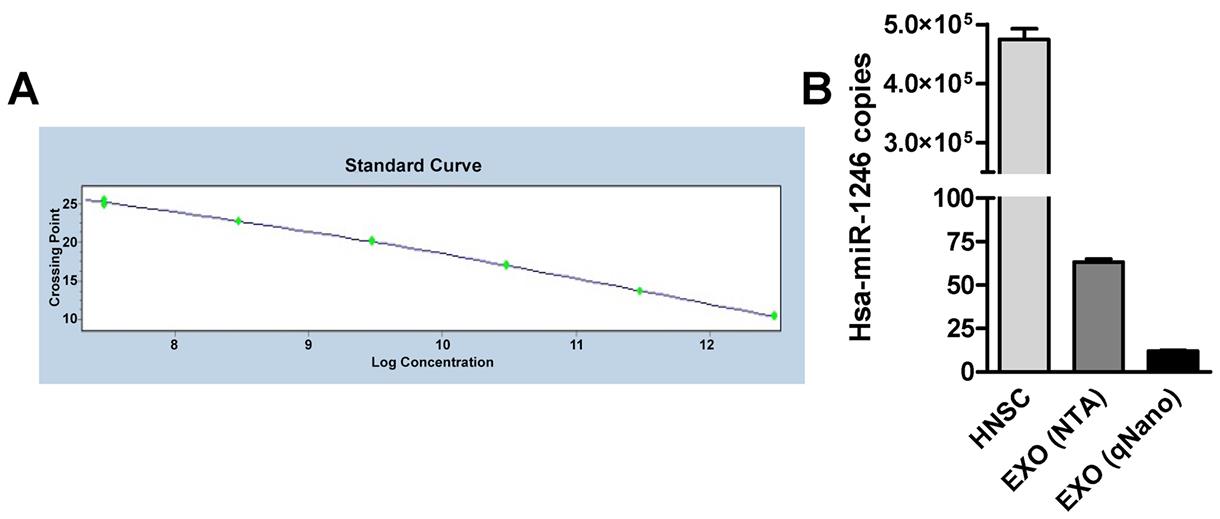 Figure 3. Quantitative analysis of miRNA abundance in hNSCs and their exosomes. (A) Standard curve for miRNA quantification, showing a dilution series of miRNA mimics from 3.01×10^12 to 3.01×10^7 copies/well. Data points are the mean of triplicate fluorescence readings. (B) Graphical representation of hsa-miR-1246 copy numbers per hNSC and per exosome. Exosome counts were determined by NTA and qNano, while cell counts were measured by hemocytometer. Error bars indicate ± SEM. (Stevanato L, et al., 2016)
Figure 3. Quantitative analysis of miRNA abundance in hNSCs and their exosomes. (A) Standard curve for miRNA quantification, showing a dilution series of miRNA mimics from 3.01×10^12 to 3.01×10^7 copies/well. Data points are the mean of triplicate fluorescence readings. (B) Graphical representation of hsa-miR-1246 copy numbers per hNSC and per exosome. Exosome counts were determined by NTA and qNano, while cell counts were measured by hemocytometer. Error bars indicate ± SEM. (Stevanato L, et al., 2016)
Why Choose Creative Biostructure?
- Efficient Isolation and Purification Technologies: We utilize advanced methods to isolate and purify stem cell-derived exosomes, ensuring high concentration and minimal contamination. Our cutting-edge processes preserve the integrity and functionality of exosomes for reliable research applications.
- High Purity and Potency Validation: Every batch of exosomes undergoes rigorous testing to guarantee high purity and potency. We verify the presence of expected proteins, lipids, and RNA, ensuring consistent results across various applications.
- Standardized Production Processes: We maintain standardized production protocols to ensure batch-to-batch consistency. This reliability is critical for researchers seeking reproducible results in their experiments.
- Customizable Exosome Services: We offer tailored exosome extraction and modification services. Our team collaborates with clients to develop specific solutions that meet their unique research requirements.
Resources
Frequently Asked Questions
-
Are your exosomes suitable for clinical applications?
Our exosomes are intended for research purposes only. They are not for clinical use or diagnosis.
-
How can I verify the purity of exosomes?
All of our exosome batches are subjected to comprehensive validation, including assessments of their size, protein content, and functional capabilities, to ensure purity and efficacy.
-
Can you customize exosomes for specific research needs?
Yes, we offer customizable exosome services to cater to specific research requirements, such as isolation from a particular stem cell type or tailored modifications for drug delivery.
Unlock the power of stem cell-derived exosomes for your research! Contact us today to learn more about our high-quality exosome standards and customizable services.
References
- Stevanato L, Thanabalasundaram L, Vysokov N, et al. Investigation of content, stoichiometry and transfer of miRNA from human neural stem cell line derived exosomes. PLoS One. 2016. 11(1): e0146353.
- Nikfarjam S, Rezaie J, Zolbanin N M, et al. Mesenchymal stem cell derived-exosomes: a modern approach in translational medicine. Journal of Translational Medicine. 2020. 18: 1-21.
- Rezaeian A R, Khatami F, Heidari Keshel S, et al. The effect of mesenchymal stem cells-derived exosomes on the prostate, bladder, and renal cancer cell lines. Scientific Reports. 2022, 12(1): 20924.
